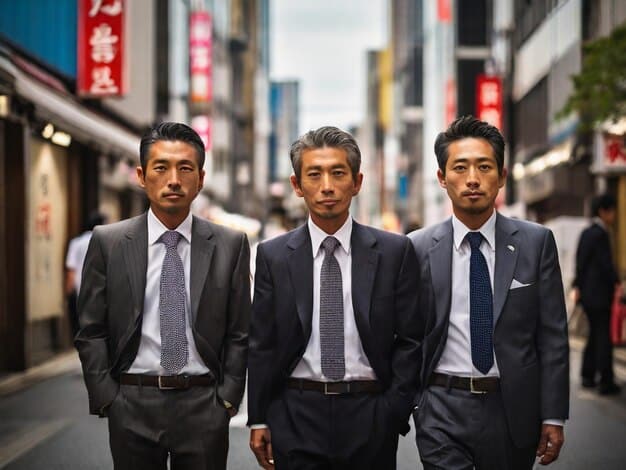The Rise of Salaryman Dramas: Social Commentary in J-Drama Reviews

The Rise of the Salaryman Drama: Analyzing the Social Commentary in explores the emergence and significance of Japanese dramas that depict the lives, struggles, and societal critiques embedded within the experiences of salarymen, offering a lens into Japan’s corporate culture.
Dive into the world of Japanese television as we explore The Rise of the Salaryman Drama: Analyzing the Social Commentary in. These dramas offer a compelling look into the lives of Japanese office workers and the societal issues they confront.
The Evolution of Salaryman Dramas
Salaryman dramas have become a prominent genre in Japanese television, reflecting the evolving dynamics of Japanese corporate culture. These shows capture the essence of the salaryman experience, offering both comedic and dramatic portrayals of their lives.
Initially, salaryman dramas focused on lighter, more comedic aspects. Over time, however, they’ve evolved to tackle deeper social issues. This shift reflects a broader awareness and critique of corporate culture in Japan.
Early Representations of Salarymen
Early dramas often depicted salarymen as hardworking but somewhat buffoonish figures. These shows emphasized humor and the everyday struggles of office life.
- Focus on comedic relief through exaggerated scenarios.
- Simple narratives about work-life balance.
- Characters embodying common stereotypes of Japanese workers.
The Shift Towards Social Commentary
More recent dramas have begun to address serious issues such as overwork, harassment, and the pressures of conformity. This shift highlights a growing desire to critique and reform harmful aspects of Japanese corporate culture.

This evolution provides viewers with a critical lens through which to examine their own work environments and societal expectations. The social commentary in these dramas resonates with many Japanese viewers who face similar challenges.
In conclusion, the evolution of salaryman dramas reflects a significant shift in how Japanese society views its corporate culture, moving from light-hearted humor to serious social critique.
Key Themes in Salaryman Dramas
Salaryman dramas often explore several recurring themes that provide insight into Japanese society. These themes are crucial for understanding the popularity and impact of the dramas.
Recurring themes include the pressure to conform, the struggles of work-life balance, and the impact of corporate culture on personal relationships. These elements resonate deeply with viewers who experience similar issues in their own lives.
Conformity and Individuality
Many dramas highlight the pressure to conform to corporate norms and expectations, often at the expense of individuality. This theme explores the challenges faced by individuals seeking to maintain their identity while fitting into a rigid corporate structure.
The conflict between conformity and individuality is a central tension in many salaryman dramas, reflecting a broader societal struggle in Japan. Characters often grapple with the decision to either follow the group or assert their own unique identity.
Work-Life Balance Struggles
The difficulty of balancing work and personal life is another common theme. Dramas often depict the long hours, intense pressure, and lack of personal time experienced by salarymen.
- Portrayals of overwork and its impact on mental health.
- Sacrifices made in personal relationships due to job demands.
- Quest for finding equilibrium between career and leisure.
Corporate Culture vs. Personal Relationships
Salaryman dramas explore how corporate culture affects personal relationships, including family, friendships, and romantic connections. These dramas often show the strain that work can place on these bonds.
These themes collectively paint a picture of the complex challenges faced by salarymen in Japan, providing a platform for social critique and fostering discussions about needed reforms.

In summary, the central themes of conformity, work-life balance, and the impact of corporate culture are fundamental to understanding the social commentary present in salaryman dramas.
Notable Salaryman Dramas and Their Impact
Several salaryman dramas have gained significant popularity and critical acclaim, leaving a lasting impact on Japanese television. These series are celebrated for their insightful portrayals and relevant social commentary.
Notable dramas like “Hanzawa Naoki” and “Midnight Diner” have resonated with audiences due to their compelling storylines and relatable characters. These shows often spark broader conversations about work culture and societal values.
“Hanzawa Naoki”: A Landmark Drama
“Hanzawa Naoki” is one of the most successful salaryman dramas in recent history. Its themes of justice, revenge, and the fight against corruption resonated deeply with Japanese viewers.
- High ratings and widespread media attention.
- Exploration of corruption within the banking industry.
- A protagonist who stands up against injustice.
“Midnight Diner”: A Different Perspective
While not exclusively focused on salarymen, “Midnight Diner” often features characters who are salarymen. The drama provides a more intimate and character-driven look at their lives.
This series uses the setting of a late-night diner to explore the personal stories of its diverse clientele, including salarymen. The show offers a nuanced and empathetic portrayal of their daily struggles.
These dramas demonstrate the power of television to reflect and influence social attitudes, highlighting the importance of salaryman dramas in Japanese popular culture.
In conclusion, “Hanzawa Naoki” and “Midnight Diner” represent significant contributions to the genre, each offering unique perspectives on the lives and challenges of Japanese salarymen.
The Portrayal of Women in Salaryman Dramas
The portrayal of women in salaryman dramas has evolved over time, reflecting changing gender dynamics in Japanese society. Early dramas often depicted women in stereotypical roles, while more recent shows are challenging these representations.
Historically, women in salaryman dramas were often relegated to supporting roles, such as secretaries or love interests. However, modern dramas are increasingly featuring women in positions of power and exploring their unique challenges in the workplace.
Historical Stereotypes
Early dramas often depicted women in limited and stereotypical roles. These representations reinforced traditional gender norms and often failed to reflect the realities of women in the workplace.
The focus on traditional roles often marginalized women’s experiences and contributions, perpetuating outdated views of gender roles in corporate settings.
Modern Representations and Empowerment
More recent dramas are providing more nuanced and empowered portrayals of women. These shows feature women as leaders, innovators, and complex characters with their own ambitions and struggles.
These representations challenge traditional stereotypes and offer a more realistic portrayal of women’s experiences in the modern Japanese workplace. By exploring the unique challenges faced by women, these dramas contribute to broader discussions about gender equality and empowerment.
These evolving portrayals underscore the broader societal shifts in Japan, advocating for more inclusive and equitable representations in television and beyond.
In summary, the portrayal of women in salaryman dramas has undergone significant changes, reflecting a broader movement towards gender equality and more nuanced representation in Japanese media.
Salaryman Dramas as a Reflection of Japanese Society
Salaryman dramas serve as a mirror reflecting the values, challenges, and anxieties of Japanese society. These shows are not just entertainment; they are cultural artifacts that provide insight into the collective mindset of Japan.
By exploring themes such as conformity, work-life balance, and societal expectations, salaryman dramas offer a critical commentary on the pressures faced by individuals in Japan. These dramas often spark conversations about the need for change and reform.
Societal Expectations and Pressures
These dramas frequently highlight the high expectations placed on individuals to succeed in their careers and conform to societal norms. The pressure to meet these expectations can lead to stress, anxiety, and a sense of alienation.
The shows often depict characters struggling to balance their personal desires with the demands of their jobs and families, reflecting a common tension in Japanese society.
Critique of Corporate Culture
Salaryman dramas also offer a critique of Japanese corporate culture, exposing issues such as overwork, harassment, and lack of work-life balance. These critiques often resonate with viewers who have experienced similar challenges in their own workplaces.
- Exposing exploitative labor practices.
- Highlighting issues of power imbalance.
- Advocating for healthier work environments.
By addressing these issues, salaryman dramas contribute to a broader dialogue about the need for reform and a more humane approach to work.
These cultural narratives encourage reflection and conversation, acting as a catalyst for potential societal shifts.
In conclusion, salaryman dramas are a powerful medium for reflecting and critiquing Japanese society, providing a platform for discussing important issues and advocating for change.
The Future of Salaryman Dramas
The future of salaryman dramas is likely to see continued innovation and evolution, with a greater emphasis on diversity, inclusivity, and nuanced storytelling. These shows will likely continue to address contemporary social issues and reflect the changing landscape of Japanese society.
As societal attitudes evolve, salaryman dramas are expected to adapt, incorporating new perspectives and addressing emerging challenges. This includes exploring themes such as diversity, mental health, and the changing nature of corporate culture.
Embracing Diversity and Inclusivity
Future dramas are likely to feature more diverse casts and storylines, reflecting the increasing diversity of Japanese society. This includes portraying characters from different backgrounds, ethnicities, and sexual orientations.
By embracing diversity and inclusivity, salaryman dramas can become more representative of the broader Japanese population and offer a wider range of perspectives.
Addressing Mental Health and Well-being
The mental health of salarymen is a growing concern, and future dramas are likely to address this issue more directly. These shows may explore the impact of overwork, stress, and societal pressure on mental well-being.
By raising awareness about mental health, salaryman dramas can contribute to reducing stigma and encouraging individuals to seek help when needed.
These ongoing developments will ensure that salaryman dramas remain relevant and continue to resonate with audiences.
In summary, the future of salaryman dramas promises continued innovation, with a focus on diversity, mental health, and the evolving nature of Japanese corporate culture.
| Key Point | Brief Description |
|---|---|
| 🏢 Corporate Culture | Exploration of Japanese corporate values and norms. |
| ⚖️ Work-Life Balance | Struggles and sacrifices in pursuing a balanced life. |
| 🎭 Societal Critique | Reflection on societal issues and needed reforms. |
| 🚺 Women’s Roles | Evolving portrayals of women in the workplace. |
Frequently Asked Questions (FAQ)
▼
Salaryman dramas are Japanese television shows that focus on the lives, challenges, and experiences of office workers in Japan. They often explore themes of corporate culture, work-life balance, and societal expectations.
▼
These dramas resonate with a wide audience because they reflect the realities and struggles faced by many Japanese workers. They provide a platform for social critique and offer both comedic and dramatic portrayals.
▼
Initially, these dramas focused on lighter, comedic aspects of office life. Over time, they have evolved to tackle deeper social issues, such as overwork, harassment, and the pressure to conform in Japanese society.
▼
Key themes include the pressure to conform to corporate norms, the challenges of balancing work and personal life, the impact of corporate culture on personal relationships, and the quest for individuality in a rigid system.
▼
Salaryman dramas serve as a mirror, reflecting the values, challenges, and anxieties of Japanese society. They offer a critical commentary on the pressures faced by individuals and spark conversations about the need for change.
Conclusion
In conclusion, the rise of the salaryman drama: analyzing the social commentary in Japanese television offers a compelling lens through which to understand the complexities and challenges of corporate life in Japan. These dramas not only entertain but also provide valuable insights into the societal issues that affect millions of workers, making them a significant part of Japanese popular culture.





